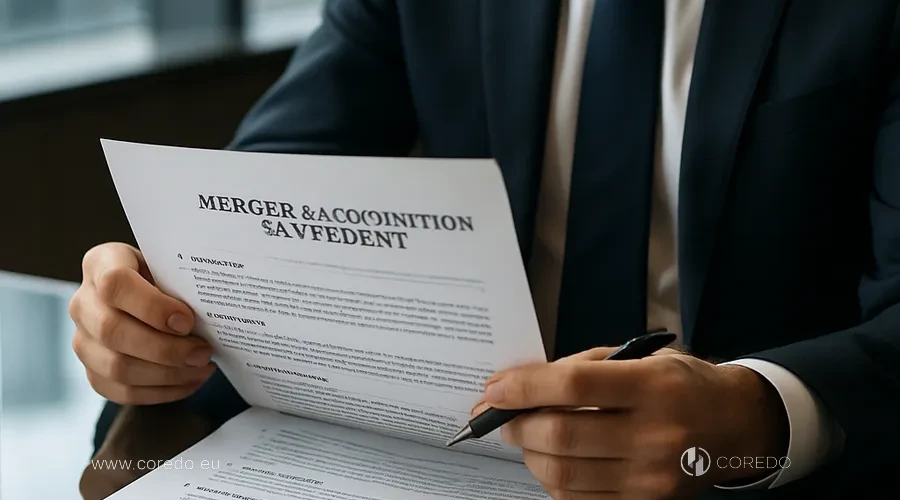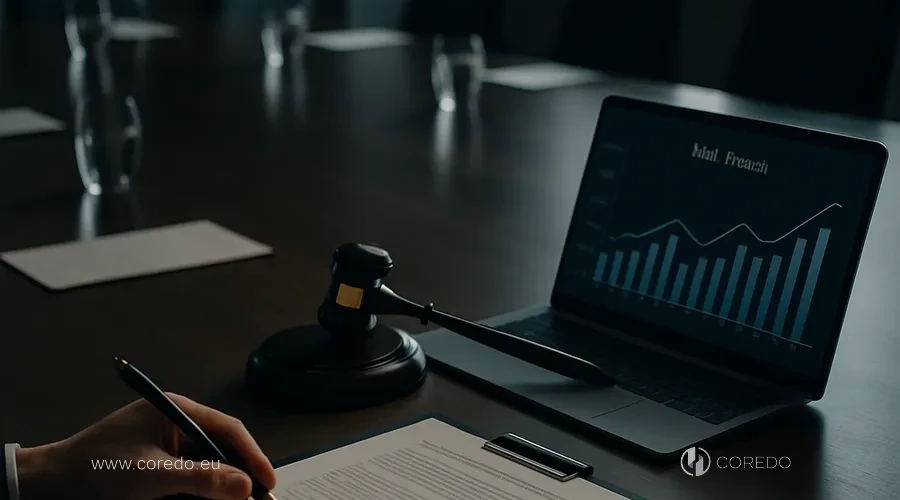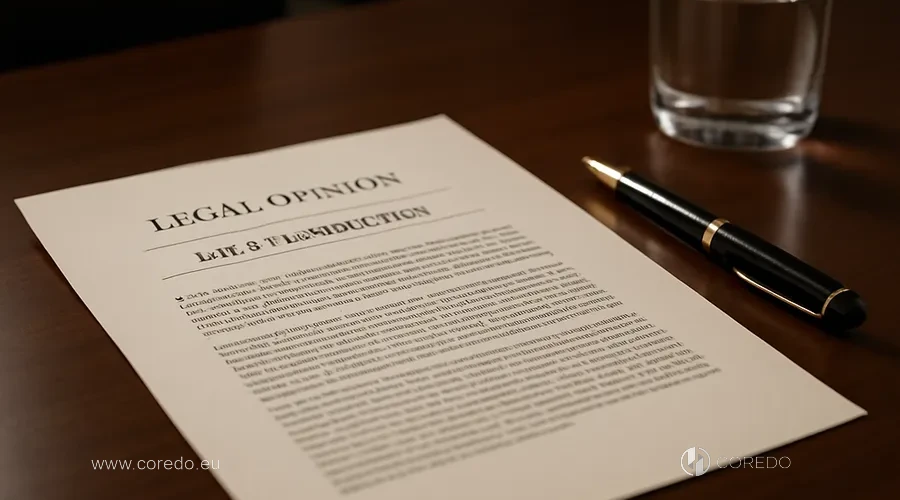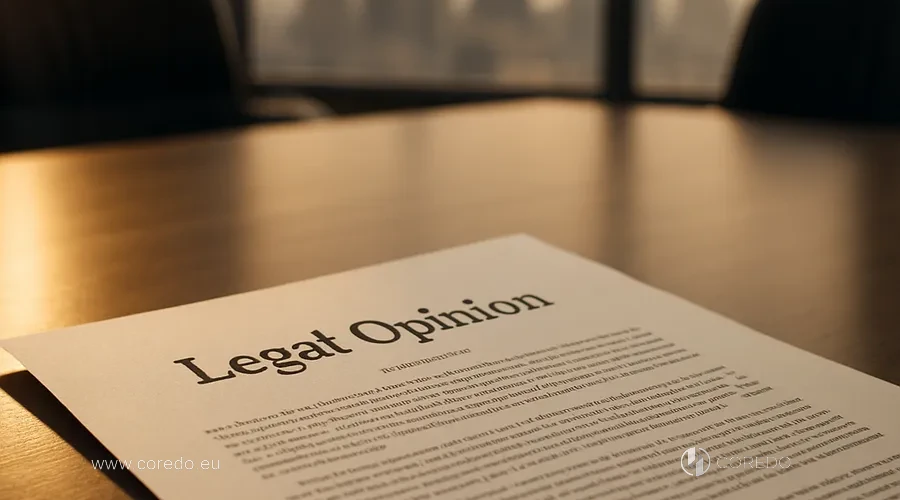Imagine that you are ready to complete a major merger or acquisition deal, having spent months on negotiations, financial analysis and business valuation. And at the very last moment it turns out that the target company has hidden lawsuits that could cost you millions. According to a PwC study, nearly 40% of M&A deals encounter serious legal surprises after closing that directly affect the value and sustainability of the business. Why does this happen? Because many deal participants underestimate the role of one of the most powerful protection tools: Legal Opinion.
Legal Opinion is not just a formal document, but an independent legal opinion that analyzes the legal status of the target company, identifies hidden risks and confirms the legality of the transaction. In the context of increasing complexity of international deals, tightening compliance requirements and high market volatility, a Legal Opinion becomes a mandatory element for any serious investor or buyer.
In this article I will explain why a legal opinion is needed in company mergers, how Legal Opinion reduces risks in M&A deals, which legal risks it identifies, and how to properly use it to protect your interests. You will learn when a Legal Opinion is mandatory, how to prepare it for purchasing a company, and what documents are needed to draft it. We will review practical examples, strategic and financial aspects, as well as features of Legal Opinion in international transactions and different jurisdictions. This article is your practical guide to Legal Opinion in M&A deals, which will help you make informed strategic decisions and minimize risks.
Legal Opinion in M&A transactions, what is it and why is it needed?

# Definition and content of Legal Opinion
Unlike Due Diligence, which is a comprehensive review of the financial, legal and operational aspects of a company, Legal Opinion focuses specifically on legal risks and legal status. Legal Opinion includes analysis of the corporate structure, verification of licensing status, assessment of tax liabilities, analysis of contractual obligations, review of intellectual property rights and identification of hidden legal risks.
A Legal Opinion can be prepared for either the buyer or the seller, and is used to confirm the legality of the transaction, protect the parties from legal risks and minimize post-transaction financial losses.
The importance of a Legal Opinion for deal participants
A Legal Opinion plays a key role in M&A transactions, protecting the interests of all parties. For the buyer, a Legal Opinion is a tool for risk minimization, confirming the legality of the transaction and protecting investments. For the seller, a Legal Opinion helps confirm the company’s legal status, increase investor confidence and speed up the transaction process. For investors, a Legal Opinion is an independent legal opinion that confirms the company’s investment attractiveness and reduces the risk of investment loss.
A Legal Opinion is used in representations & warranties and in a disclosure letter, which allows the parties to be protected from legal issues and minimize risks after the closing of the transaction.
When and why a Legal Opinion is required in M&A transactions
A Legal Opinion is required in mandatory and recommended cases. In mandatory cases, a Legal Opinion is necessary to confirm the legality of the transaction, obtain financial licenses, comply with regulatory requirements and protect the interests of the parties. In recommended cases, a Legal Opinion is used to minimize risks, increase investor confidence and accelerate the transaction process.
A Legal Opinion affects the structure and terms of the transaction, helps in price negotiations, defines the terms of post-closing obligations and protects the parties from legal risks. A Legal Opinion is also used to confirm compliance with AML/KYC requirements, verify licensing status and analyze the corporate structure.
Legal risks in M&A and Legal Opinion

Main types of legal risks in mergers and acquisitions transactions
These risks can significantly affect the value and resilience of a business, and can also lead to post-transaction financial losses.
Legal Opinion also verifies compliance with AML requirements/KYC, analyzes the company’s litigation history and identifies potential fines and sanctions.
Methods of Risk Assessment and Identification in a Legal Opinion
Legal Opinion integrates with Legal Due Diligence (LDD) and other checks, allowing a multi-level Due Diligence to be conducted and identifying all possible legal risks. Legal Opinion analyzes the corporate structure, the legal status of the target company, licensing status, tax liabilities, contractual obligations, intellectual property rights and hidden legal risks. Legal Opinion also verifies compliance with AML/KYC requirements, analyzes the company’s litigation history and identifies potential fines and sanctions.
Legal Opinion uses various methods for assessing and identifying risks, including legal audit (Legal Audit), multi-level Due Diligence, corporate Due Diligence, financial Due Diligence, tax Due Diligence, compliance checks, AML compliance assessment, analysis of financial regulation, deal structuring and legal analysis of the counterparty.
Practical examples of identified risks and their impact on a deal
For example, when buying a company involved in litigation, Legal Opinion helps identify potential litigation claims and lawsuit risks, which helps minimize post-transaction financial losses. When buying a company with a problematic corporate history, Legal Opinion helps uncover hidden legal risks, obligations to affiliated parties, and license revocation risks.
Legal Opinion also assists in the acquisition of licensed businesses (fintech, crypto), identifying risks of legal non-compliance, compliance risks (AML/KYC), license revocation risks and obligations to affiliated parties. Legal Opinion provides protection when purchasing a company with obligations to affiliated parties by uncovering hidden legal risks and liabilities. Legal Opinion also analyzes specific risks in real estate transactions, identifying property ownership risks, regulatory breach risks and risks of contractual non-performance.
Legal Opinion in M&A transactions

Stages of preparing a legal opinion
The process of preparing a Legal Opinion includes several stages: collection and analysis of documents, interaction with the seller’s and buyer’s teams, preparation of the legal opinion and its approval. Collection and analysis of documents includes corporate documentation, contracts, transactional documents, disclosure letter, representations & warranties, inspection reports. Interaction with the seller’s and buyer’s teams makes it possible to obtain all necessary data and documents for preparing the Legal Opinion.
The preparation of the legal opinion includes analysis of the corporate structure, the legal status of the target company, licensing status, tax liabilities, contractual obligations, intellectual property rights and hidden legal risks. The approval of the Legal Opinion takes place after its preparation and review by all parties to the transaction.
Documents and data required to prepare a Legal Opinion
To prepare a Legal Opinion, the following documents and data are required: corporate documentation, contracts, transactional documents, disclosure letter, representations & warranties, inspection reports. Corporate documentation includes the company’s charter, meeting minutes, shareholder registers. Contracts include agreements with counterparties, lease agreements, loan agreements. Transactional documents include sale and purchase agreements, merger agreements, acquisition agreements. The disclosure letter contains information on disclosure, representations & warranties contain the parties’ representations and warranties, inspection reports contain the results of the legal review.
Timing and cost of preparing a legal opinion
The timing and cost of preparing a Legal Opinion depend on the complexity of the transaction, the volume of documents, regulator requirements and the jurisdiction. On average legal opinion preparation takes from several days to several weeks. The cost of a Legal Opinion depends on the scope of work, transaction complexity and jurisdiction. For large international transactions the cost of a Legal Opinion can be significant, but it is offset by the risks identified and the minimization of post-transaction financial losses.
Impact of Legal Opinion on M&A Strategy

How a Legal Opinion Helps in Negotiations and Deal Structuring
A Legal Opinion helps in negotiations over the transaction price, deal structuring and defining the terms of post-closing obligations. A Legal Opinion allows minimizing risks, adjusting the transaction price, defining the terms of post-closing obligations and protecting parties from legal issues. A Legal Opinion is also used to confirm the legality of the transaction, protect the parties from legal risks and minimize post-closing financial losses.
The Role of Legal Opinion in Purchase Decisions and Long-Term Business Sustainability
A Legal Opinion helps protect investments, assess ROI, enhance the strategic advantages of the deal and increase market share. A Legal Opinion also helps minimize the risk of investment loss, increase investor confidence and speed up the deal process.
Use of legal opinion in representations and warranties and in the disclosure letter
A Legal Opinion is used in representations & warranties and the disclosure letter to protect parties from legal issues and minimize risks after the closing of the deal. Representations & warranties contain the parties’ statements and guarantees, the disclosure letter contains information for disclosure. A Legal Opinion allows confirming the legality of the transaction, protecting the parties from legal risks and minimizing post-closing financial losses.
Legal Opinion in International Transactions

Accounting for differences in the laws of Europe, Asia, Africa, and the CIS
Legal Opinion takes into account differences in the laws of Europe, Asia, Africa and the CIS. Legal Opinion analyzes the corporate structure, the legal status of the target company, licensing status, tax obligations, contractual obligations, intellectual property rights and hidden legal risks in accordance with the legislation of each jurisdiction. Legal Opinion also checks compliance with AML/KYC requirements, analyzes the company’s litigation history and identifies potential fines and sanctions.
Specific risks and requirements in international M&A transactions
International M&A transactions are associated with specific risks and requirements, including regulatory requirements, AML/KYC, Licensing, and currency control. Legal Opinion helps identify these risks by analyzing the corporate structure, the legal status of the target company, licensing status, tax obligations, contractual obligations, intellectual property rights and hidden legal risks. Legal Opinion also checks compliance with AML/KYC requirements, analyzes the company’s litigation history and identifies potential fines and sanctions.
Legal Opinion for specialized sectors: fintech, crypto, real estate, startups
Legal Opinion for specialized sectors (fintech, crypto, real estate, startups) includes additional checks and analysis of specific risks. Legal Opinion for fintech and crypto companies analyzes risks of legal non-compliance, compliance risks (AML/KYC), risks of license revocation and obligations to affiliates. Legal Opinion for real estate analyzes risks of property ownership, legal non-compliance and risks of breach of contractual obligations. Legal Opinion for startups analyzes risks of legal non-compliance, compliance risks (AML/KYC), risks of license revocation and obligations to affiliates.
Recommendations for Entrepreneurs and Investors
How to Effectively Use a Legal Opinion to Minimize Risks
Legal Opinion is a powerful tool for risk mitigation in M&A transactions. To effectively use a Legal Opinion, it is necessary to conduct multi-level Due Diligence, analyze the corporate structure, the legal status of the target company, licensing status, tax liabilities, contractual obligations, intellectual property rights and hidden legal risks. A Legal Opinion also helps in negotiations on the transaction price, deal structuring and defining the terms of post-closing obligations.
Best Practices for Working with Legal Advisors
To work effectively with legal advisors, it is necessary to provide all required documents and data, clearly formulate goals and objectives, regularly update information and documents, and promptly respond to requests from legal advisors. Best practices for working with legal advisors help speed up the preparation of a Legal Opinion and minimize risks.
Common Mistakes When Preparing and Using a Legal Opinion and How to Avoid Them
Common mistakes when preparing and using a Legal Opinion include an insufficient volume of documents, incorrect formulation of goals and objectives, lack of regular updates to information and documents, and failure to respond promptly to requests from legal advisors. To avoid these mistakes, it is necessary to conduct multi-level Due Diligence, analyze the corporate structure, the legal status of the target company, licensing status, tax liabilities, contractual obligations, intellectual property rights and hidden legal risks.
Recommendations for Integrating a Legal Opinion into a Company’s Risk Management System
A Legal Opinion should be integrated into the company’s risk management system to minimize risks, increase investor confidence and speed up the transaction process. A Legal Opinion helps identify hidden legal risks, obligations to affiliated parties, risks of license revocation and obligations to affiliated parties. A Legal Opinion also helps in negotiations on the transaction price, deal structuring and defining the terms of post-closing obligations.
Conclusion
Legal Opinion is a key tool for protecting the interests of parties in M&A transactions. Legal Opinion helps identify hidden legal risks, obligations to affiliated persons, risks of license revocation and obligations to affiliated persons. Legal Opinion also helps in negotiations on the deal price, deal structuring and in defining the terms of post-closing obligations. Legal Opinion should be integrated into the company’s risk management system to minimize risks, increase investor confidence and accelerate the transaction process.
For timely and professional legal support of transactions, contact the experts at COREDO. We are ready to help you prepare a Legal Opinion, conduct Due Diligence, structure the deal and minimize risks.